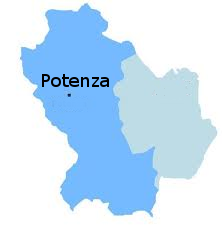Sintesi del progetto in inglese
 The project New.Met.Bas has been coordinated by the USR (Regional Education Authority) of Basilicata that has been pursuing a strong internationalization policy for a decade. It has started “Sportello Europa”, offering a constant support service to teachers involved in eTwinning and Erasmus Plus projects; it ran two Erasmus Plus KA1 consortiums, one aimed to improve the teachers’ competences (QUAL.IS.BAS project) and the other one for digital teaching experts (AN.DI.BAS project); it organizes training events and English language courses for DNL teachers (teachers of non language subjects) aimed to implement the CLIL (Content and Language Integrated Learning) method in the schools of the region. The USR has involved five high secondary schools in this project: IIS “Nitti” Potenza, LiceoScientifico “Galilei” Potenza, IIS “Da Vinci” Potenza, Liceo Scientifico “Pasolini Potenza and IIS “Duni-Levi” Matera. In the school year 2018/2019, due to the updating of the regional school organization, the cashier school IIS “Nitti” Potenza joined IIS “Da Vinci” Potenza under the name of IIS “L. Da Vinci- F.S. Nitti” Potenza. These schools have proved to be highly dynamic and have been working on the development of teachers’ and students’ language competencies and on strategic innovation for years by now. Project mobility has been designed to satisfy the common need of activating new spaces for digital learning set up with the European Funds (PON) and to join advanced digital teaching innovation and collaborative and active methodologies that, however, teachers did not master perfectly well. Therefore, most of the teaching staff involved in the mobilities participated in structured courses about Cooperative learning, digital and flipped teaching to fully accomplish the school mission. In addition, schools in Finland, France, Spain and Sweden were the other partners involved in job shadowing activities. Thanks to the project activities (structured courses and job shadowing) the following objectives have been successfully achieved: a) to know new methodologies focusing on the students’ self-learning process and classroom follow-up; b) to know active learning methodologies; c) to empower the language and professional skills of the teachers involved in CLIL practice training; d) to improve the language and professional skills of the teachers working in the ESABAC and ESABAC Techno school; e) to observe different models of school management and school administration through job shadowing practice. The project has involved 78 members of the school staff: 73 teachers attended either structured courses or job shadowing activities while 2 headmistresses, 1 administration director, 1 clerk and the “Sportello Europa” operator joined job shadowing activities. The learning short-term outcomes for the involved staff are: a) empowering methodological competencies and boosting innovation; reinforcing language competencies; c) increasing intercultural competencies. As for the long-term impact the project includes a wider and more confident internationalization and innovation process and it is contributing to the creation of a regional task-force ready to use CLIL and other innovative methodologies.
The project New.Met.Bas has been coordinated by the USR (Regional Education Authority) of Basilicata that has been pursuing a strong internationalization policy for a decade. It has started “Sportello Europa”, offering a constant support service to teachers involved in eTwinning and Erasmus Plus projects; it ran two Erasmus Plus KA1 consortiums, one aimed to improve the teachers’ competences (QUAL.IS.BAS project) and the other one for digital teaching experts (AN.DI.BAS project); it organizes training events and English language courses for DNL teachers (teachers of non language subjects) aimed to implement the CLIL (Content and Language Integrated Learning) method in the schools of the region. The USR has involved five high secondary schools in this project: IIS “Nitti” Potenza, LiceoScientifico “Galilei” Potenza, IIS “Da Vinci” Potenza, Liceo Scientifico “Pasolini Potenza and IIS “Duni-Levi” Matera. In the school year 2018/2019, due to the updating of the regional school organization, the cashier school IIS “Nitti” Potenza joined IIS “Da Vinci” Potenza under the name of IIS “L. Da Vinci- F.S. Nitti” Potenza. These schools have proved to be highly dynamic and have been working on the development of teachers’ and students’ language competencies and on strategic innovation for years by now. Project mobility has been designed to satisfy the common need of activating new spaces for digital learning set up with the European Funds (PON) and to join advanced digital teaching innovation and collaborative and active methodologies that, however, teachers did not master perfectly well. Therefore, most of the teaching staff involved in the mobilities participated in structured courses about Cooperative learning, digital and flipped teaching to fully accomplish the school mission. In addition, schools in Finland, France, Spain and Sweden were the other partners involved in job shadowing activities. Thanks to the project activities (structured courses and job shadowing) the following objectives have been successfully achieved: a) to know new methodologies focusing on the students’ self-learning process and classroom follow-up; b) to know active learning methodologies; c) to empower the language and professional skills of the teachers involved in CLIL practice training; d) to improve the language and professional skills of the teachers working in the ESABAC and ESABAC Techno school; e) to observe different models of school management and school administration through job shadowing practice. The project has involved 78 members of the school staff: 73 teachers attended either structured courses or job shadowing activities while 2 headmistresses, 1 administration director, 1 clerk and the “Sportello Europa” operator joined job shadowing activities. The learning short-term outcomes for the involved staff are: a) empowering methodological competencies and boosting innovation; reinforcing language competencies; c) increasing intercultural competencies. As for the long-term impact the project includes a wider and more confident internationalization and innovation process and it is contributing to the creation of a regional task-force ready to use CLIL and other innovative methodologies.
USR Basilicata has realized that this project has contributed to the achievement of the ambitious goal of implementing “innovation hubs”, actually already at work, able to lead and support the quality development of all the schools in the Basilicata region, starting from the headteachers and involving both the teaching and the administration staff so that it is possible to become a best practice model in a European dimension.



 Scuola in chiaro
Scuola in chiaro
